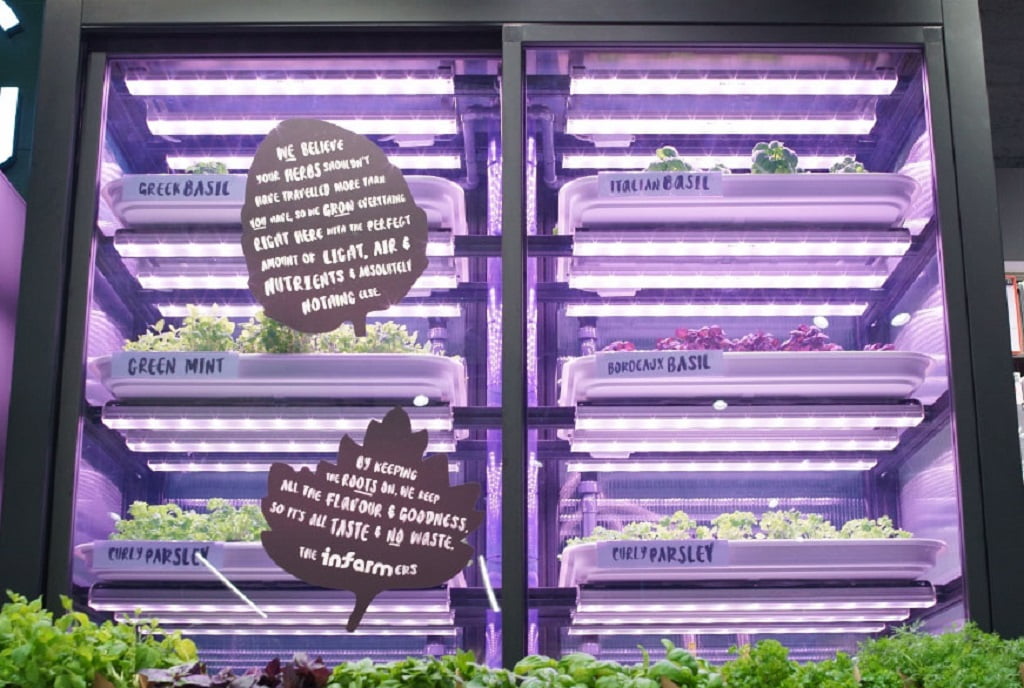Israeli-founded urban farming startup Infarm, which combines vertical farms with IoT technology and machine learning, has announced the launch of its new high-capacity Growing Center, an automated and modular local farm and distribution center that can generate the crop-equivalent of up to 10,000 sqm of farmland, with food production up to 400 times more efficient than soil-based agriculture.
The cloud-connected, high-yield growing centers developed by Infarm join their expanding global network of self-learning farms that improve plant yield, taste, and nutritional value around the world.
Infarm already provides fresh produce to 50% of the world’s largest food retailers. The sustainable and efficient urban farming system, founded by Israeli brothers Erez and Guy Galonska alongside Osnat Michaeli, is currently available in ten countries and 30 cities in thousands of stores.
The rapid deployment capability of these Growing Centers “will drive additional global growth and scalability to match the needs of retailers of any size in any location,” Infarm said in a statement. The goal is to grow the network to 500,000 sqm by 2025.
A Growing Center is comprised of dozens of modular farming units, each standing between ten and 18 meters high, occupying a 25 sqm ground footprint and requiring just six weeks to build, yielding the crop-equivalent of 10,000 sqm of farmland.
Infarm plans to establish 100 Growing Centers by 2025. This is equivalent to 1.5 million sqm of farmland. The company plans to produce 450,000,000 plants across its network, including expanding to new markets. This year, 15 Infarm Growing Centers are already planned or are under construction in major urban centers, including London, Paris, Copenhagen, Toronto, Vancouver, Seattle, and Tokyo.

The Berlin-based startup, which was founded in 2013, has vertical farms located in urban areas like supermarkets, distribution centers, and restaurants. Many of these facilities are already hooked up with smart devices connected to the cloud that monitor plant health and resource consumption. They integrate engineering, software, and agritech to reduce labor, land, water, and energy costs, while also creating a more sustainable food system.
“The entire Infarm network is connected to a central farming brain that gathers more than 50,000 growth, color, and spectral data points through a plant’s lifetime,” said Guy Galonska, co-founder and chief technology officer at Infarm. “We’ve collected more than 300 billion data points throughout our farming network to date. These data enable us to perfect our growing recipes and improve yield, quality, and nutritional value, while reducing the production price constantly.”
Many of the world’s leading food retailers are already taking part in Infarm’s farming network, including Empire Company Ltd (Safeway, Sobeys, ThriftyFoods), Whole Foods Markets, Marks & Spencer, Kroger, Kinokuniya, Aldi, Amazon, Auchan, Casino, E.Leclerc, Edeka, Intermarché, Irma, Kaufland, Metro, Migros, Selgros, Summit. Infarm’s coverage spans Germany, Canada, Denmark, France, Japan, Luxembourg, the Netherlands, the United Kingdom, the United States, and Switzerland.
“Access to fresh, local, and sustainable food is a growing challenge as people shift towards cities and climate change accelerates,” said Erez Galonska, co-founder and CEO of Infarm. “Today, we’re adding speed to scale with new technology that allows us to deploy a Growing Center to any city in the world in a fraction of the time, space, and capital investment of most large-scale farming solutions today. Both the farms and the software that powers them were designed to make fresh food more accessible for everyone, everywhere.”
This article first appeared in NoCamels, which covers innovations from Israel for a global audience.

